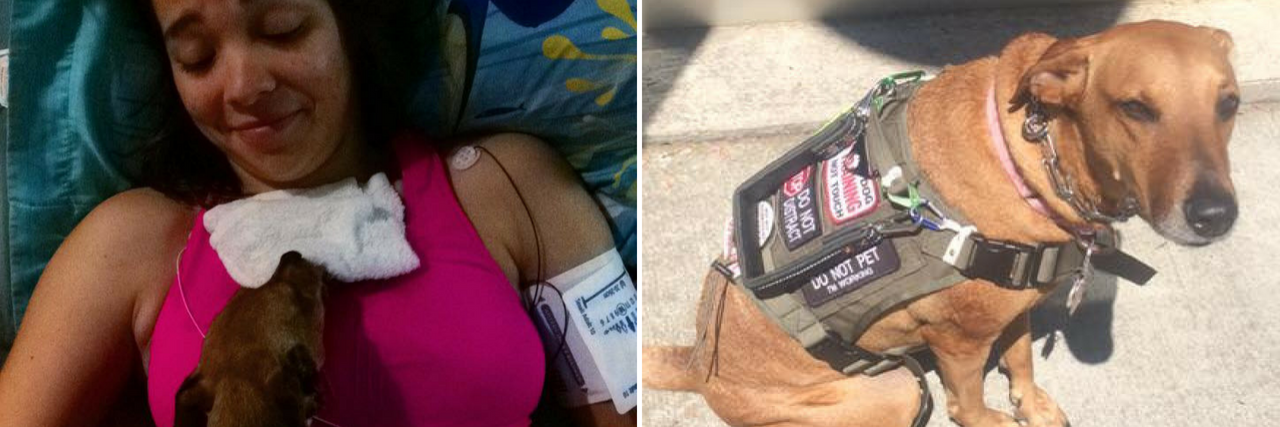For many in the chronic illness community, pets can be comforting companions on difficult days when you’re stuck at home battling a flare-up of symptoms. But for many people who live with a form of dysautonomia, or autonomic dysfunction, training a service dog to help them with specific tasks can radically change their life – whether the dog is helping their human cope with a symptom, or navigate their everyday routine.
We wanted to know how service dogs specifically help those with dysautonomia, so we asked our Mighty community to share a photo of their dog helping them cope with dysautonomia symptoms. If you have a service dog, let us know how they help you with your chronic illness symptoms in the comments below.
Here are some of the service dogs in our community:
1. “When I feel dizzy my service dog will lick me to try to keep me from passing out when I lay down. This picture was taken when I had just had surgery and I picked my head up and got super dizzy so she did her thing. She can also pick things up for me and get help if I get hurt when I pass out.” – Alexis G.M.
2. “When my heart rate spikes my service dog alerts me so I can sit or lay down. She also alerts me to blood pressure changes. When I do end up passing out she licks my face until I become conscious again and if it takes more than 30 seconds she goes and gets help. She also picks things up for me, and gets me stuff when I ask her.” – Brittany T.
3. “Rosie provides blood pressure alerts, provides deep pressure therapy which can give temporary relief if I have really low blood pressure and also helps with the panic attacks I get, wakes me up to alarms/loud noises/etc. since the medicine I take makes me sleep through them, does light mobility work as well as counterbalance support, and licks and nuzzles me if I have a syncope episode to help me stay calm when I ‘come back around.’ She is such a source of comfort and I am so grateful for her.” – Sarah B.
4. “My service dog gives me so much independence. I can go places by myself without having to worry that I am going to faint because she alerts me to high heart rate.” – Aubrey A.
5. “My service dog will pick up things that I drop that are out of reach. She also does counterbalance and forward momentum when I am not in my wheelchair.” – Charlotte H.
6. “She helps with dropped items and brings me blankets when asked, alerts to before I faint and alerts to when I have fainted to get help. Along with other tasks.” – Kayli A.S.
7. “Remi is a mobility assist dog. I hold onto his harness for balance, and he’s trained to provide counterbalance as well. He can also help me get up if I fall, and knows ‘brace’ so I can lean on him for support.” – Courtney M.
8. “When my heart rate spikes, blood pressure drops or oxygen levels drop my service dog paws at my lap to tell me something is wrong. I then know to sit down and check my vitals. We go from there depending on what is actually going on. If I lose consciousness she will go and get help. She has given me so much independence and I have been able to do things I couldn’t even imagine doing a few years ago.” – Margaret W.
9. “Duke, my service dog, alerts me before having a syncope event. This has given me a newfound freedom. I can go out shopping and not have to worry that I will face plant on the cement floors. His alert gives me enough time to lay down. He also can get me water, my meds and things I have dropped. He does DPT [deep pressure therapy] as well. Don’t know what I would do without this guy.” – Devan D.
10. “I just got [my service puppy] last month after lots of research and deciding to self-train due to my mixed needs. He is already very attached to me and so far seems to stay closer on higher pain days.” – Marybeth M.
11. “My service dog in training has changed my life! He alerts when my blood sugar is low, when my heart rate goes too high and I am going to pass out, when I have mast cell reactions and when I stop breathing! Dogs are honestly the most amazing animals out there!” – Cienna D.
12. “My service dog alerts to pre-syncope (high heart rate accompanied by low blood pressure). He also retrieves items I drop so I don’t have to bend over. My dysautonomia causes GI issues as well, so we have trained him to alert to low blood sugar as well. I’m so lucky to have him!” – Cheyenne U.
13. “Maple retrieves things for me, and performs deep pressure therapy when I fall to the ground. She also helps with light mobility, by giving me something to hold onto when I lose my balance.” – Cassandra B.
14. “My service dog alerts to a rising heart rate, does a fainting response if I faint, picks up things I drop and alerts my parents if I’m unresponsive to her alerts, plus many other tasks. She’s my life savior and my everything.” – Savannah T.















